Cambridge Analytica Case: Ethical Implications and Recommendations
VerifiedAdded on 2023/01/23
|6
|1770
|56
Essay
AI Summary
This essay provides a comprehensive analysis of the ethical issues surrounding Cambridge Analytica, a political consulting firm that gained notoriety for its unethical data practices during election campaigns. It delves into the background of the incident, highlighting the company's acquisition and use of Facebook data without user consent, and the subsequent impact on stakeholders, including users, privacy advocates, and lawmakers. The essay identifies specific ethical principles violated, such as data privacy, transparency, and permission, and discusses the global implications of the scandal, extending beyond the United States. Furthermore, it offers recommendations for companies to avoid similar incidents in the future, emphasizing the importance of acknowledging wrongful acts, maintaining oversight of third-party data usage, prioritizing user privacy, and implementing proactive privacy policies. The essay concludes by underscoring the need for heightened security measures and ethical considerations in the digital age to protect user data and prevent malicious use.

Cambridge Analytica – elections influencing
Paraphrase This Document
Need a fresh take? Get an instant paraphrase of this document with our AI Paraphraser
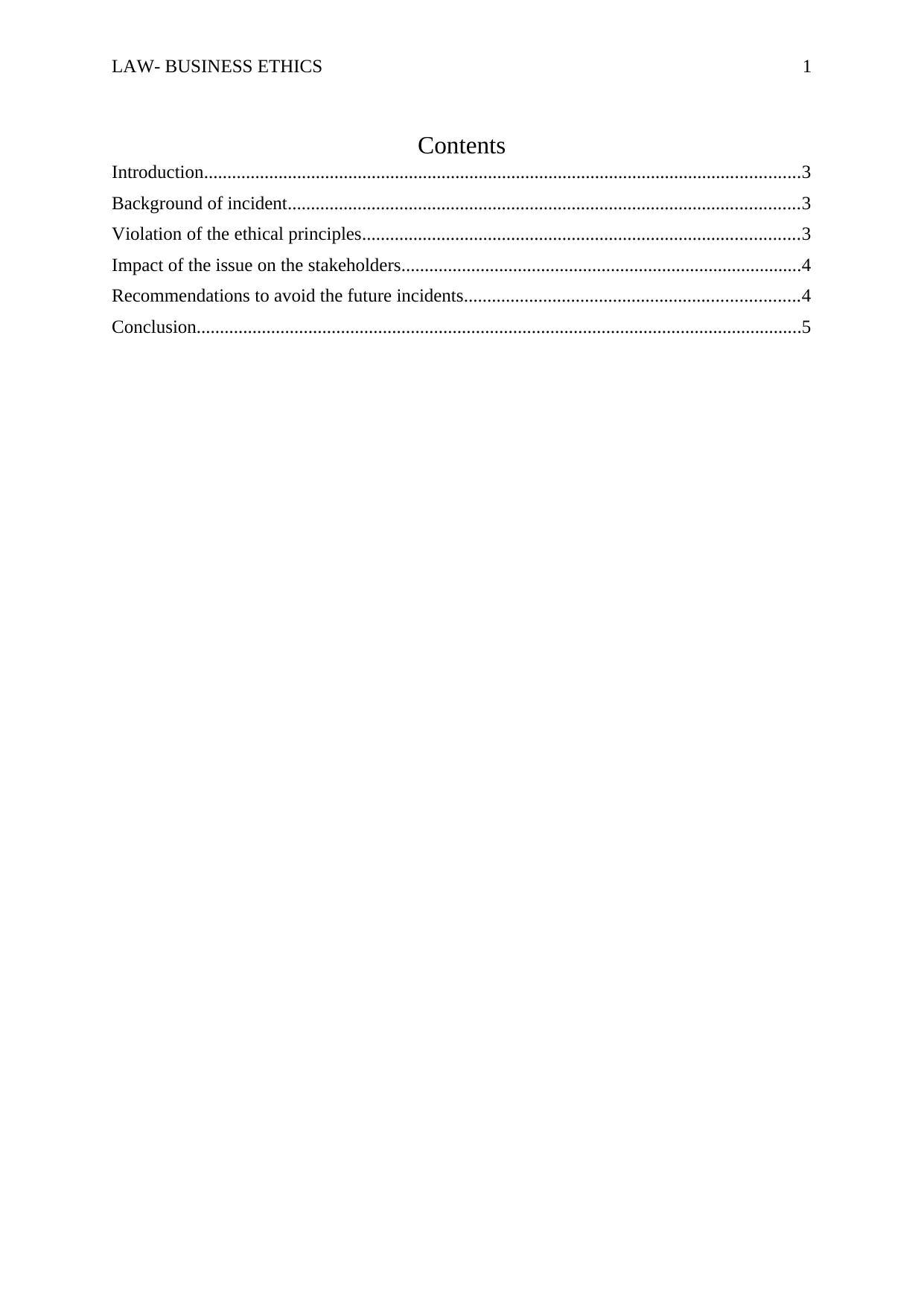
LAW- BUSINESS ETHICS 1
Contents
Introduction................................................................................................................................3
Background of incident..............................................................................................................3
Violation of the ethical principles..............................................................................................3
Impact of the issue on the stakeholders......................................................................................4
Recommendations to avoid the future incidents........................................................................4
Conclusion..................................................................................................................................5
Contents
Introduction................................................................................................................................3
Background of incident..............................................................................................................3
Violation of the ethical principles..............................................................................................3
Impact of the issue on the stakeholders......................................................................................4
Recommendations to avoid the future incidents........................................................................4
Conclusion..................................................................................................................................5
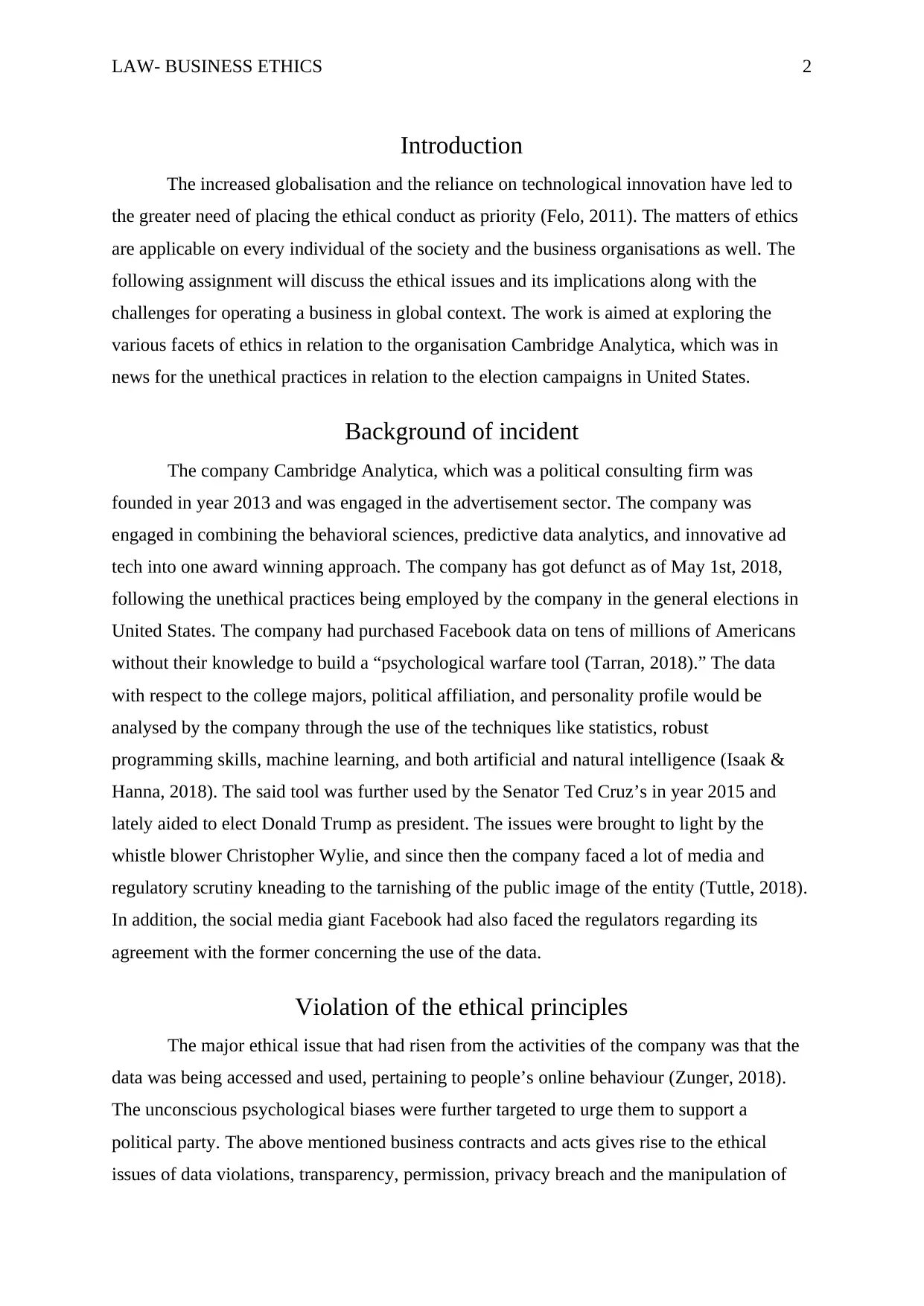
LAW- BUSINESS ETHICS 2
Introduction
The increased globalisation and the reliance on technological innovation have led to
the greater need of placing the ethical conduct as priority (Felo, 2011). The matters of ethics
are applicable on every individual of the society and the business organisations as well. The
following assignment will discuss the ethical issues and its implications along with the
challenges for operating a business in global context. The work is aimed at exploring the
various facets of ethics in relation to the organisation Cambridge Analytica, which was in
news for the unethical practices in relation to the election campaigns in United States.
Background of incident
The company Cambridge Analytica, which was a political consulting firm was
founded in year 2013 and was engaged in the advertisement sector. The company was
engaged in combining the behavioral sciences, predictive data analytics, and innovative ad
tech into one award winning approach. The company has got defunct as of May 1st, 2018,
following the unethical practices being employed by the company in the general elections in
United States. The company had purchased Facebook data on tens of millions of Americans
without their knowledge to build a “psychological warfare tool (Tarran, 2018).” The data
with respect to the college majors, political affiliation, and personality profile would be
analysed by the company through the use of the techniques like statistics, robust
programming skills, machine learning, and both artificial and natural intelligence (Isaak &
Hanna, 2018). The said tool was further used by the Senator Ted Cruz’s in year 2015 and
lately aided to elect Donald Trump as president. The issues were brought to light by the
whistle blower Christopher Wylie, and since then the company faced a lot of media and
regulatory scrutiny kneading to the tarnishing of the public image of the entity (Tuttle, 2018).
In addition, the social media giant Facebook had also faced the regulators regarding its
agreement with the former concerning the use of the data.
Violation of the ethical principles
The major ethical issue that had risen from the activities of the company was that the
data was being accessed and used, pertaining to people’s online behaviour (Zunger, 2018).
The unconscious psychological biases were further targeted to urge them to support a
political party. The above mentioned business contracts and acts gives rise to the ethical
issues of data violations, transparency, permission, privacy breach and the manipulation of
Introduction
The increased globalisation and the reliance on technological innovation have led to
the greater need of placing the ethical conduct as priority (Felo, 2011). The matters of ethics
are applicable on every individual of the society and the business organisations as well. The
following assignment will discuss the ethical issues and its implications along with the
challenges for operating a business in global context. The work is aimed at exploring the
various facets of ethics in relation to the organisation Cambridge Analytica, which was in
news for the unethical practices in relation to the election campaigns in United States.
Background of incident
The company Cambridge Analytica, which was a political consulting firm was
founded in year 2013 and was engaged in the advertisement sector. The company was
engaged in combining the behavioral sciences, predictive data analytics, and innovative ad
tech into one award winning approach. The company has got defunct as of May 1st, 2018,
following the unethical practices being employed by the company in the general elections in
United States. The company had purchased Facebook data on tens of millions of Americans
without their knowledge to build a “psychological warfare tool (Tarran, 2018).” The data
with respect to the college majors, political affiliation, and personality profile would be
analysed by the company through the use of the techniques like statistics, robust
programming skills, machine learning, and both artificial and natural intelligence (Isaak &
Hanna, 2018). The said tool was further used by the Senator Ted Cruz’s in year 2015 and
lately aided to elect Donald Trump as president. The issues were brought to light by the
whistle blower Christopher Wylie, and since then the company faced a lot of media and
regulatory scrutiny kneading to the tarnishing of the public image of the entity (Tuttle, 2018).
In addition, the social media giant Facebook had also faced the regulators regarding its
agreement with the former concerning the use of the data.
Violation of the ethical principles
The major ethical issue that had risen from the activities of the company was that the
data was being accessed and used, pertaining to people’s online behaviour (Zunger, 2018).
The unconscious psychological biases were further targeted to urge them to support a
political party. The above mentioned business contracts and acts gives rise to the ethical
issues of data violations, transparency, permission, privacy breach and the manipulation of
⊘ This is a preview!⊘
Do you want full access?
Subscribe today to unlock all pages.

Trusted by 1+ million students worldwide
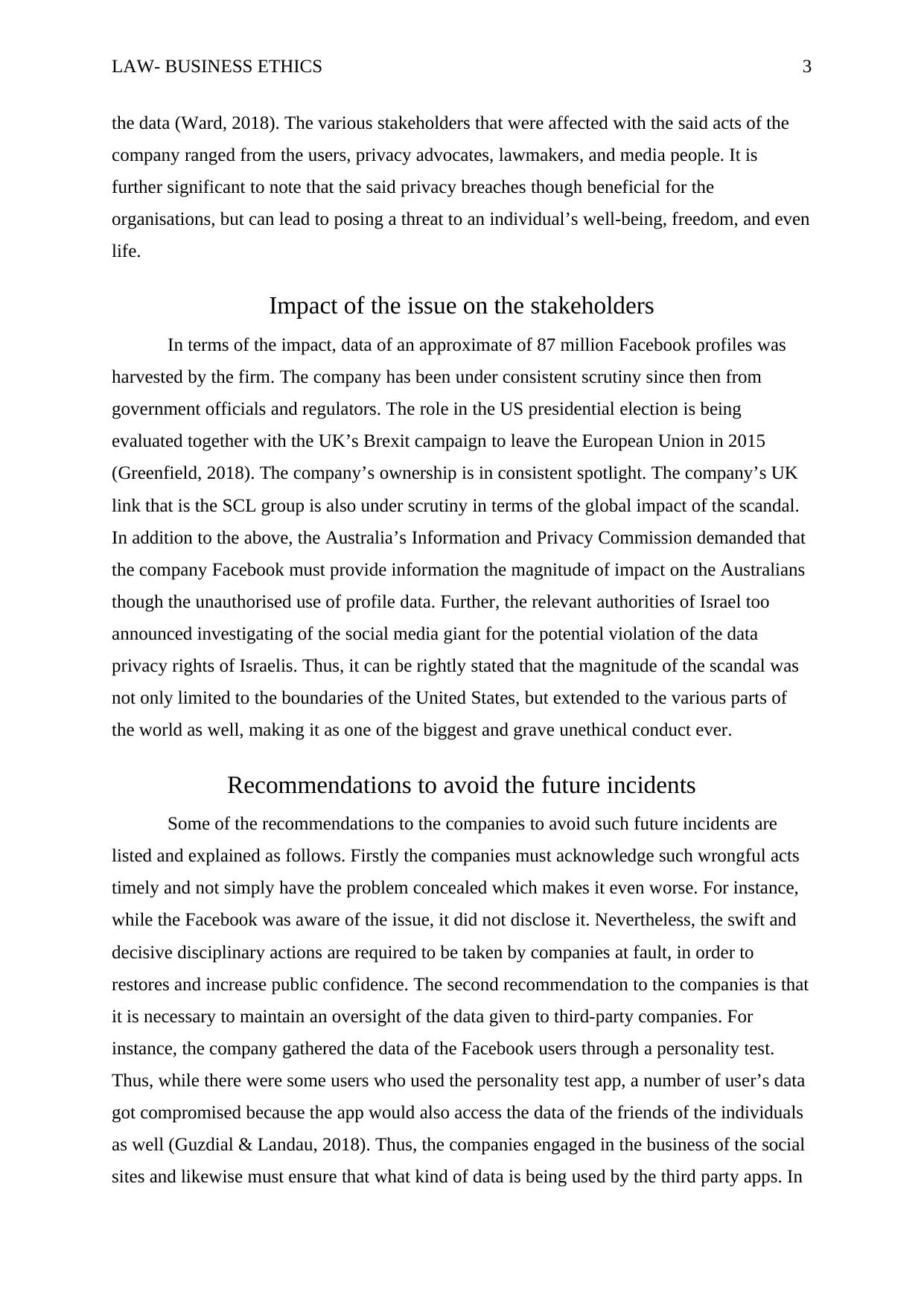
LAW- BUSINESS ETHICS 3
the data (Ward, 2018). The various stakeholders that were affected with the said acts of the
company ranged from the users, privacy advocates, lawmakers, and media people. It is
further significant to note that the said privacy breaches though beneficial for the
organisations, but can lead to posing a threat to an individual’s well-being, freedom, and even
life.
Impact of the issue on the stakeholders
In terms of the impact, data of an approximate of 87 million Facebook profiles was
harvested by the firm. The company has been under consistent scrutiny since then from
government officials and regulators. The role in the US presidential election is being
evaluated together with the UK’s Brexit campaign to leave the European Union in 2015
(Greenfield, 2018). The company’s ownership is in consistent spotlight. The company’s UK
link that is the SCL group is also under scrutiny in terms of the global impact of the scandal.
In addition to the above, the Australia’s Information and Privacy Commission demanded that
the company Facebook must provide information the magnitude of impact on the Australians
though the unauthorised use of profile data. Further, the relevant authorities of Israel too
announced investigating of the social media giant for the potential violation of the data
privacy rights of Israelis. Thus, it can be rightly stated that the magnitude of the scandal was
not only limited to the boundaries of the United States, but extended to the various parts of
the world as well, making it as one of the biggest and grave unethical conduct ever.
Recommendations to avoid the future incidents
Some of the recommendations to the companies to avoid such future incidents are
listed and explained as follows. Firstly the companies must acknowledge such wrongful acts
timely and not simply have the problem concealed which makes it even worse. For instance,
while the Facebook was aware of the issue, it did not disclose it. Nevertheless, the swift and
decisive disciplinary actions are required to be taken by companies at fault, in order to
restores and increase public confidence. The second recommendation to the companies is that
it is necessary to maintain an oversight of the data given to third-party companies. For
instance, the company gathered the data of the Facebook users through a personality test.
Thus, while there were some users who used the personality test app, a number of user’s data
got compromised because the app would also access the data of the friends of the individuals
as well (Guzdial & Landau, 2018). Thus, the companies engaged in the business of the social
sites and likewise must ensure that what kind of data is being used by the third party apps. In
the data (Ward, 2018). The various stakeholders that were affected with the said acts of the
company ranged from the users, privacy advocates, lawmakers, and media people. It is
further significant to note that the said privacy breaches though beneficial for the
organisations, but can lead to posing a threat to an individual’s well-being, freedom, and even
life.
Impact of the issue on the stakeholders
In terms of the impact, data of an approximate of 87 million Facebook profiles was
harvested by the firm. The company has been under consistent scrutiny since then from
government officials and regulators. The role in the US presidential election is being
evaluated together with the UK’s Brexit campaign to leave the European Union in 2015
(Greenfield, 2018). The company’s ownership is in consistent spotlight. The company’s UK
link that is the SCL group is also under scrutiny in terms of the global impact of the scandal.
In addition to the above, the Australia’s Information and Privacy Commission demanded that
the company Facebook must provide information the magnitude of impact on the Australians
though the unauthorised use of profile data. Further, the relevant authorities of Israel too
announced investigating of the social media giant for the potential violation of the data
privacy rights of Israelis. Thus, it can be rightly stated that the magnitude of the scandal was
not only limited to the boundaries of the United States, but extended to the various parts of
the world as well, making it as one of the biggest and grave unethical conduct ever.
Recommendations to avoid the future incidents
Some of the recommendations to the companies to avoid such future incidents are
listed and explained as follows. Firstly the companies must acknowledge such wrongful acts
timely and not simply have the problem concealed which makes it even worse. For instance,
while the Facebook was aware of the issue, it did not disclose it. Nevertheless, the swift and
decisive disciplinary actions are required to be taken by companies at fault, in order to
restores and increase public confidence. The second recommendation to the companies is that
it is necessary to maintain an oversight of the data given to third-party companies. For
instance, the company gathered the data of the Facebook users through a personality test.
Thus, while there were some users who used the personality test app, a number of user’s data
got compromised because the app would also access the data of the friends of the individuals
as well (Guzdial & Landau, 2018). Thus, the companies engaged in the business of the social
sites and likewise must ensure that what kind of data is being used by the third party apps. In
Paraphrase This Document
Need a fresh take? Get an instant paraphrase of this document with our AI Paraphraser
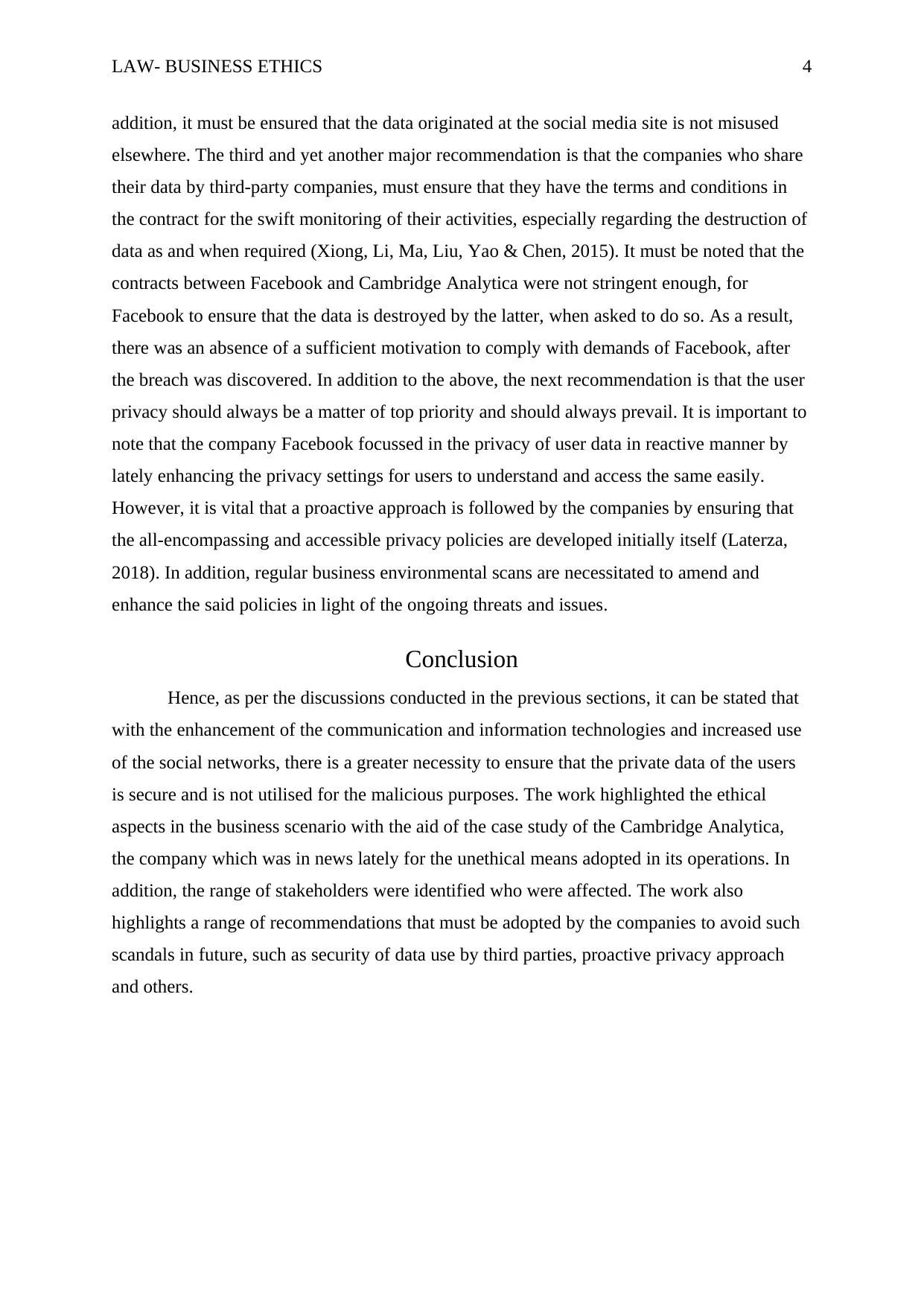
LAW- BUSINESS ETHICS 4
addition, it must be ensured that the data originated at the social media site is not misused
elsewhere. The third and yet another major recommendation is that the companies who share
their data by third-party companies, must ensure that they have the terms and conditions in
the contract for the swift monitoring of their activities, especially regarding the destruction of
data as and when required (Xiong, Li, Ma, Liu, Yao & Chen, 2015). It must be noted that the
contracts between Facebook and Cambridge Analytica were not stringent enough, for
Facebook to ensure that the data is destroyed by the latter, when asked to do so. As a result,
there was an absence of a sufficient motivation to comply with demands of Facebook, after
the breach was discovered. In addition to the above, the next recommendation is that the user
privacy should always be a matter of top priority and should always prevail. It is important to
note that the company Facebook focussed in the privacy of user data in reactive manner by
lately enhancing the privacy settings for users to understand and access the same easily.
However, it is vital that a proactive approach is followed by the companies by ensuring that
the all-encompassing and accessible privacy policies are developed initially itself (Laterza,
2018). In addition, regular business environmental scans are necessitated to amend and
enhance the said policies in light of the ongoing threats and issues.
Conclusion
Hence, as per the discussions conducted in the previous sections, it can be stated that
with the enhancement of the communication and information technologies and increased use
of the social networks, there is a greater necessity to ensure that the private data of the users
is secure and is not utilised for the malicious purposes. The work highlighted the ethical
aspects in the business scenario with the aid of the case study of the Cambridge Analytica,
the company which was in news lately for the unethical means adopted in its operations. In
addition, the range of stakeholders were identified who were affected. The work also
highlights a range of recommendations that must be adopted by the companies to avoid such
scandals in future, such as security of data use by third parties, proactive privacy approach
and others.
addition, it must be ensured that the data originated at the social media site is not misused
elsewhere. The third and yet another major recommendation is that the companies who share
their data by third-party companies, must ensure that they have the terms and conditions in
the contract for the swift monitoring of their activities, especially regarding the destruction of
data as and when required (Xiong, Li, Ma, Liu, Yao & Chen, 2015). It must be noted that the
contracts between Facebook and Cambridge Analytica were not stringent enough, for
Facebook to ensure that the data is destroyed by the latter, when asked to do so. As a result,
there was an absence of a sufficient motivation to comply with demands of Facebook, after
the breach was discovered. In addition to the above, the next recommendation is that the user
privacy should always be a matter of top priority and should always prevail. It is important to
note that the company Facebook focussed in the privacy of user data in reactive manner by
lately enhancing the privacy settings for users to understand and access the same easily.
However, it is vital that a proactive approach is followed by the companies by ensuring that
the all-encompassing and accessible privacy policies are developed initially itself (Laterza,
2018). In addition, regular business environmental scans are necessitated to amend and
enhance the said policies in light of the ongoing threats and issues.
Conclusion
Hence, as per the discussions conducted in the previous sections, it can be stated that
with the enhancement of the communication and information technologies and increased use
of the social networks, there is a greater necessity to ensure that the private data of the users
is secure and is not utilised for the malicious purposes. The work highlighted the ethical
aspects in the business scenario with the aid of the case study of the Cambridge Analytica,
the company which was in news lately for the unethical means adopted in its operations. In
addition, the range of stakeholders were identified who were affected. The work also
highlights a range of recommendations that must be adopted by the companies to avoid such
scandals in future, such as security of data use by third parties, proactive privacy approach
and others.
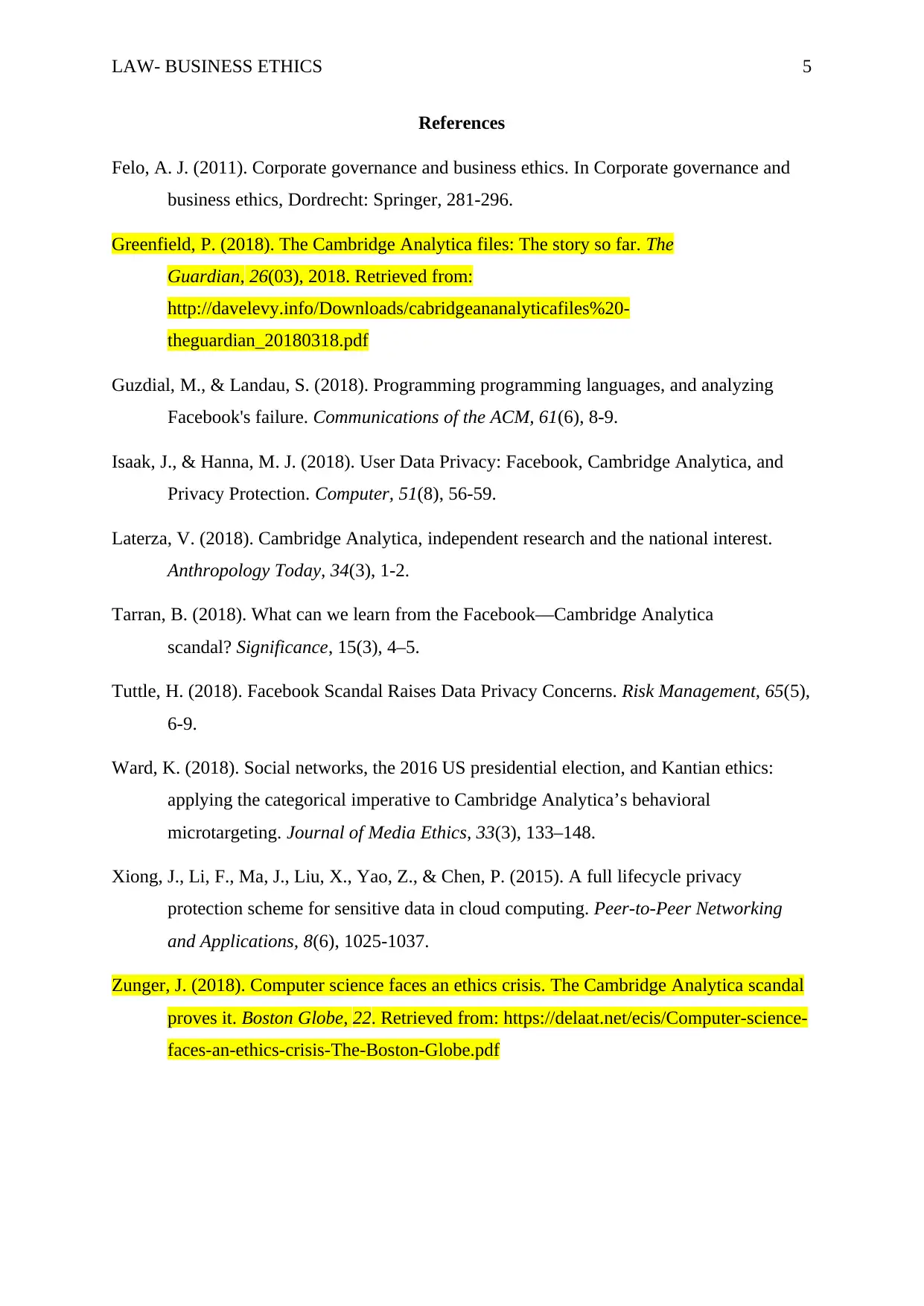
LAW- BUSINESS ETHICS 5
References
Felo, A. J. (2011). Corporate governance and business ethics. In Corporate governance and
business ethics, Dordrecht: Springer, 281-296.
Greenfield, P. (2018). The Cambridge Analytica files: The story so far. The
Guardian, 26(03), 2018. Retrieved from:
http://davelevy.info/Downloads/cabridgeananalyticafiles%20-
theguardian_20180318.pdf
Guzdial, M., & Landau, S. (2018). Programming programming languages, and analyzing
Facebook's failure. Communications of the ACM, 61(6), 8-9.
Isaak, J., & Hanna, M. J. (2018). User Data Privacy: Facebook, Cambridge Analytica, and
Privacy Protection. Computer, 51(8), 56-59.
Laterza, V. (2018). Cambridge Analytica, independent research and the national interest.
Anthropology Today, 34(3), 1-2.
Tarran, B. (2018). What can we learn from the Facebook—Cambridge Analytica
scandal? Significance, 15(3), 4–5.
Tuttle, H. (2018). Facebook Scandal Raises Data Privacy Concerns. Risk Management, 65(5),
6-9.
Ward, K. (2018). Social networks, the 2016 US presidential election, and Kantian ethics:
applying the categorical imperative to Cambridge Analytica’s behavioral
microtargeting. Journal of Media Ethics, 33(3), 133–148.
Xiong, J., Li, F., Ma, J., Liu, X., Yao, Z., & Chen, P. (2015). A full lifecycle privacy
protection scheme for sensitive data in cloud computing. Peer-to-Peer Networking
and Applications, 8(6), 1025-1037.
Zunger, J. (2018). Computer science faces an ethics crisis. The Cambridge Analytica scandal
proves it. Boston Globe, 22. Retrieved from: https://delaat.net/ecis/Computer-science-
faces-an-ethics-crisis-The-Boston-Globe.pdf
References
Felo, A. J. (2011). Corporate governance and business ethics. In Corporate governance and
business ethics, Dordrecht: Springer, 281-296.
Greenfield, P. (2018). The Cambridge Analytica files: The story so far. The
Guardian, 26(03), 2018. Retrieved from:
http://davelevy.info/Downloads/cabridgeananalyticafiles%20-
theguardian_20180318.pdf
Guzdial, M., & Landau, S. (2018). Programming programming languages, and analyzing
Facebook's failure. Communications of the ACM, 61(6), 8-9.
Isaak, J., & Hanna, M. J. (2018). User Data Privacy: Facebook, Cambridge Analytica, and
Privacy Protection. Computer, 51(8), 56-59.
Laterza, V. (2018). Cambridge Analytica, independent research and the national interest.
Anthropology Today, 34(3), 1-2.
Tarran, B. (2018). What can we learn from the Facebook—Cambridge Analytica
scandal? Significance, 15(3), 4–5.
Tuttle, H. (2018). Facebook Scandal Raises Data Privacy Concerns. Risk Management, 65(5),
6-9.
Ward, K. (2018). Social networks, the 2016 US presidential election, and Kantian ethics:
applying the categorical imperative to Cambridge Analytica’s behavioral
microtargeting. Journal of Media Ethics, 33(3), 133–148.
Xiong, J., Li, F., Ma, J., Liu, X., Yao, Z., & Chen, P. (2015). A full lifecycle privacy
protection scheme for sensitive data in cloud computing. Peer-to-Peer Networking
and Applications, 8(6), 1025-1037.
Zunger, J. (2018). Computer science faces an ethics crisis. The Cambridge Analytica scandal
proves it. Boston Globe, 22. Retrieved from: https://delaat.net/ecis/Computer-science-
faces-an-ethics-crisis-The-Boston-Globe.pdf
⊘ This is a preview!⊘
Do you want full access?
Subscribe today to unlock all pages.

Trusted by 1+ million students worldwide
1 out of 6
Related Documents
Your All-in-One AI-Powered Toolkit for Academic Success.
+13062052269
info@desklib.com
Available 24*7 on WhatsApp / Email
![[object Object]](/_next/static/media/star-bottom.7253800d.svg)
Unlock your academic potential
Copyright © 2020–2026 A2Z Services. All Rights Reserved. Developed and managed by ZUCOL.





